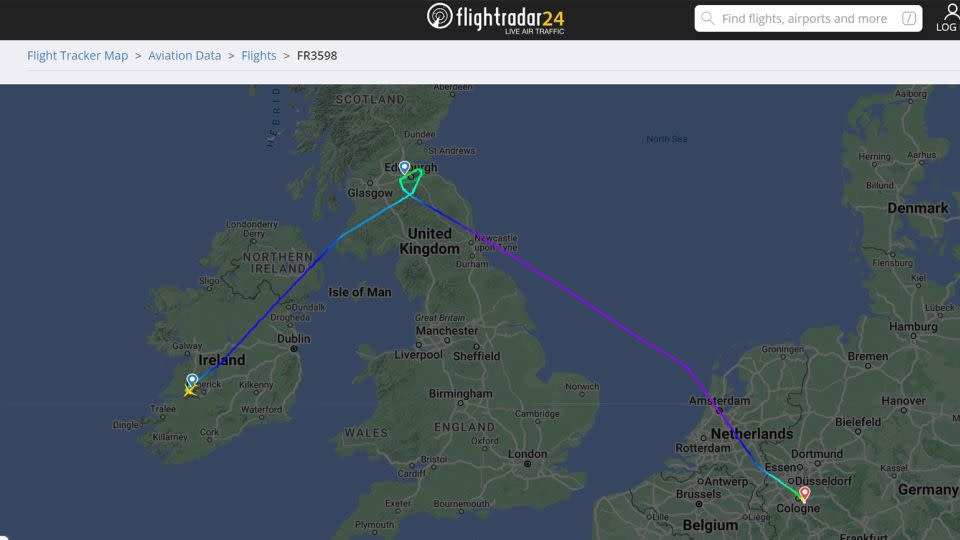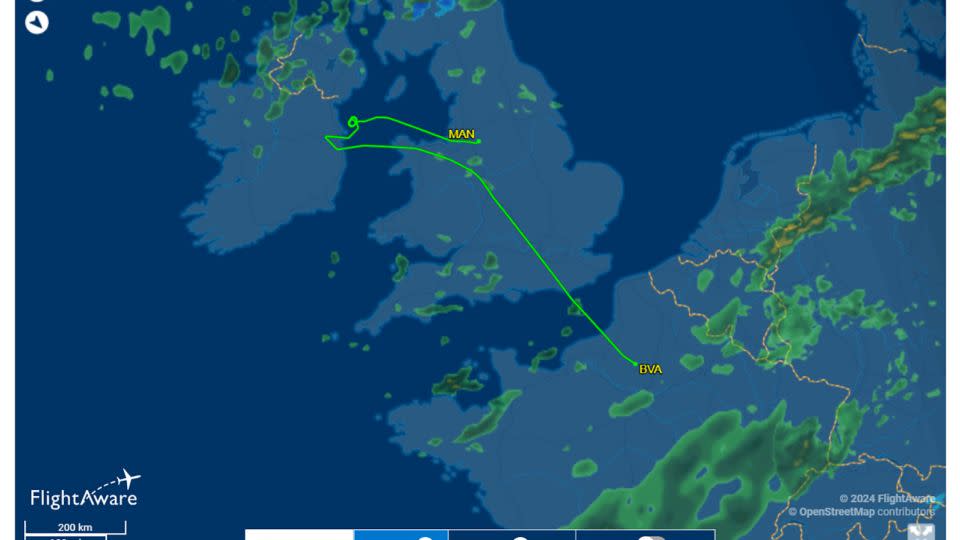Passengers wake up in the ‘wrong’ country as Storm Isha plays havoc with flight plans
Editor’s Note: Sign up for Unlocking the World, CNN Travel’s weekly newsletter. Get the latest news in aviation, food and drink, where to stay and other travel developments.
Thousands of airline passengers across Europe woke up this morning at the wrong destination – and even in the wrong country – after Storm Isha caused havoc with flights, with dozens of cancelations, diversions and go-arounds in western Europe.
It’s usually the quickest way of getting from A to B for long journeys, but for those traveling to and from Ireland and the UK last night, flying became an odyssey. Airports in Ireland and the UK were badly hit by the storm, with gusts of up to 90 mph slicing across the runways.
Many aircraft heading west diverted to safer landings in continental Europe, often having flown to the destination before failing to land. Ryanair was especially affected, since its base is Dublin, where a whopping 166 inbound and outbound flights were canceled on Sunday, according to Kevin Cullinane, group head of communications at daa, the operator of Dublin Airport.
The airport also saw 36 flight diversions and 34 go-arounds – where planes abandon landing mid-process and decide to ‘go around’ for another try.
The numbers explain the extraordinary scenes that unfolded as aircraft attempted to complete their flights to and from Ireland.
A Ryanair flight from Lanzarote, in the Canary Islands, to Dublin made it almost as far as the Irish capital, before turning around and diverting to Bordeaux, France, without attempting to land.
Quintupling flight times

Another Ryanair flight, FR555, was meant to make a quick hop from Manchester to Dublin. After circling nearby in a holding pattern, it attempted to land at Dublin but made a go-around and diverted to Paris Beauvais. What’s usually a half-hour flight became two-and-a-half hours.
Another Manchester-Dublin flight went back and forth between the UK and Ireland for over three hours, appearing to circle but abandon landing at Dublin, attempt to get on the ground at Belfast (where it made a go-around) and circling over Glasgow before landing in Liverpool – just 31 miles away from the departure airport.

A third, FR816, due to make the hour-long flight from Shannon to Edinburgh, flew all the way to Scotland and then diverted to Cologne, in Germany. It was heavily delayed, too: due to depart Dublin at 3.35 p.m. it arrived in Cologne around midnight.
A Lufthansa flight from Munich to Dublin was forced to do a go-around and return to Munich.
Cork, in Ireland, saw 13 cancelations on Sunday, as well as six diversions and seven go-arounds.
The UK was also badly hit. There were over 100 go-arounds at UK airports, according to NATS, the UK’s air traffic control operator.
“Isha made its presence felt in the south of England and Ireland, where the winds were gusting 70-75 mph, south-westerly which meant crosswinds at our major airports in the south, with wind shear and turbulence adding extra challenges for flight crews,” Steve Fox, head of network operations for NATS, wrote in a blog post.
“And in the north of the country, the winds were even more fierce, with gusts of more than 90 mph creating problems not just for aviation but the whole of the transport infrastructure.
“As UK airfields started to fill up with aircraft either unable to depart or diverted, throughout the evening we monitored the situation as aircraft diverted from Dublin to Deauville, Edinburgh to Cologne and wherever in the UK was least affected and space still available at the pilot’s critical decision point.”
There were 44 cancelations at Edinburgh, according to a spokesperson for the airport, who called Sunday’s operations “challenging.” Eight flights were diverted.
Manchester saw 14 cancelations, but fewer go-arounds than other airports because of the direction of the gusts, according to a spokesperson. “We did see some diverted flights leaving Manchester and some diverted to Manchester because of conditions at other airports, particularly Dublin,” they said. A domestic carrier, Loganair, canceled all its flights yesterday at the airport.
London’s Gatwick airport saw 22 diversions, but was able to take five flights diverted from other airports, according to a spokesperson for the airport. Stansted, northeast of London, was less affected, with nine cancelations but receiving 31 diversions.
An easyJet flight from Antalya, Turkey, to Manchester, made all the way to the UK before turning around and making a safe landing in Lyon, France.
One aircraft even attempted to land in the UK instead of continue its route. Ryanair flight 718 from Manchester to Budapest was seen descending to 1,200 feet at Stansted before ascending again and continuing to Budapest.
Flight tracking websites lit up with bizarre routes and swirls, as planes circled, waiting for a safe window to land – then turned around to divert somewhere in another country.
By Monday morning, the knock-on effects were showing, with aircraft out of position scattered across Europe. There were 29 cancelations at Dublin by 8.30 a.m., said Cullinane. Passengers affected by the storm will have additional parking charges waived, he added. There was just one cancelation at Cork today.
‘People want drama’

As is becoming customary when there’s a storm in the UK, aviation streamer Jerry Dyer of Big Jet TV was at Heathrow, watching the planes come in during the afternoon.
Although the winds hadn’t reached their peak – Dyer stopped the feed when it got dark – he caught on camera aircraft struggling with the wind and making hard landings – such as an Aeromexico flight from Mexico City, that started “oscillating” as it landed, tipping from side to side.
“It’s like driving a vehicle in heavy winds, you’re counteracting everything,” he told CNN.
“It’s very controlled, they know what they’re doing.”
Over 350,000 people have watched his footage of the Isha landings.
“People watch for entertainment value but are also secretly watching to see if anything happens – they want drama, like a go-around,” he said.
Another streamer compiled footage of every go-around at Birmingham Airport.
One pilot who landed at London Heathrow in the late afternoon told CNN that they battled winds of almost 90 knots (104 mph) at 3,000 feet, which dropped to 35 knots (40 mph) at ground level.
“Getting the aircraft onto the ground safely is a huge team effort in circumstances like yesterday and not all of that team is piloting the aircraft,” said the pilot, who wished to remain anonymous because their airline does not allow them to speak for it.
“This presents significant challenges for not only the pilots but the air traffic controllers that vector the aircraft onto their final approach. The wind was so strong yesterday we had a groundspeed that would have, in less extreme conditions, seen us overtaken by a helicopter.”
They added that dealing with situations like this are normal.
“Whilst it may be exciting and sometimes stressful for passengers, and even entertaining when narrated by Jerry from Big Jet TV, it’s all part of a day’s work for an airline pilot. We train for these extreme events and plan for success, but also consider our contingencies in great detail. Yesterday we allowed sufficient fuel for an additional approach if needed, extra holding, and even a diversion to an airport where the wind wasn’t so acute,” they said.
“Safety isn’t an accident, it’s all about planning and having options when a landing isn’t assured at your destination.”
For more CNN news and newsletters create an account at CNN.com

